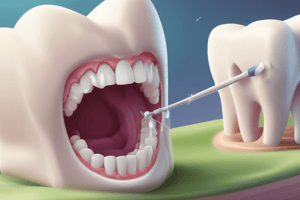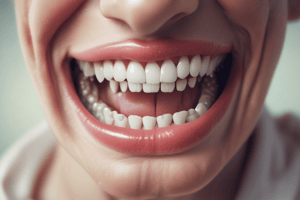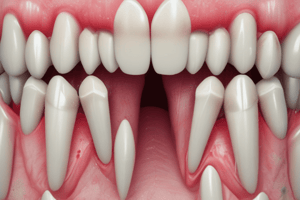Podcast
Questions and Answers
What is a common symptom of dental abrasion?
What is a common symptom of dental abrasion?
- Smooth tooth surfaces
- Blue discoloration of teeth
- Increased tooth sensitivity (correct)
- Thickening of teeth
Which of the following substances can contribute to enamel erosion?
Which of the following substances can contribute to enamel erosion?
- Lemon juice (correct)
- Olive oil
- Milk
- Honey
What is a preventive measure for dental abrasion?
What is a preventive measure for dental abrasion?
- Increasing consumption of sugary beverages
- Grinding or clenching teeth
- Using high abrasive toothpaste
- Avoiding acidic foods and drinks (correct)
What does overuse of teeth whitening products lead to?
What does overuse of teeth whitening products lead to?
What is a consequence of dental abrasion on teeth appearance?
What is a consequence of dental abrasion on teeth appearance?
What condition can result in dental abrasion?
What condition can result in dental abrasion?
What is the primary cause of dental abrasion?
What is the primary cause of dental abrasion?
How does dentin differ from enamel in terms of protection?
How does dentin differ from enamel in terms of protection?
Which factor does NOT contribute to dental abrasion?
Which factor does NOT contribute to dental abrasion?
Why are teeth more sensitive when dentin is exposed?
Why are teeth more sensitive when dentin is exposed?
What impact can consuming acidic foods and drinks have on your oral health?
What impact can consuming acidic foods and drinks have on your oral health?
How can the Relative Dentin Abrasive (RDA) score of toothpaste impact dental abrasion?
How can the Relative Dentin Abrasive (RDA) score of toothpaste impact dental abrasion?
Flashcards are hidden until you start studying
Study Notes
Dental Abrasion: Understanding the Impact on Oral Health
Dental abrasion is a common oral health condition characterized by excessive tooth wear due to various factors such as brushing too hard, using abrasive toothpaste, consuming acidic foods and drinks, grinding teeth, and utilizing whitening products. It can lead to several dental problems, affecting both the aesthetics and functionality of your teeth.
What Is Dental Abrasion?
Dental abrasion involves wearing away the protective enamel layer of your teeth, exposing the dentin underneath. Enamel is the hardest substance in your body, but it can still wear away due to excessive friction or chemical erosion. Once exposed, dentin is more susceptible to tooth decay because it does not have fluoride protection like enamel. As dentin wears away, teeth become sensitive to hot and cold temperatures, sweets, and air pressure changes.
Common Causes of Dental Abrasion
Brushing Technique and Toothpaste Choices
Brushing too vigorously can cause abrasions as it accelerates the wearing process of dental tissues. Additionally, using toothpaste with high abrasiveness can contribute to dental abrasion. Opt for toothpaste with a low Relative Dentin Abrasive (RDA) score if you are prone to dental sensitivity, enamel loss, or recession.
Acidic Diet
Consuming acidic foods and drinks can affect your oral health. These substances lower your mouth's pH level, which increases the risk of tooth erosion and dental abrasion. Lemon juice, citric acid found in soft drinks, and sugar-free diet drinks are examples of acidic substances that can cause enamel erosion.
Grinding or Bruxism
Grinding or clenching your teeth, a condition known as bruxism, can lead to dental abrasion. This habit can wear down enamel and dentin, causing teeth to become sensitive and prone to decay. It is a common problem in people who have anxiety or are under stress.
Whitening Products
Overuse of teeth whitening products can cause dental abrasion. These products contain abrasive agents that remove stains from the surface of your teeth. However, excessive use can lead to enamel erosion and sensitivity.
Symptoms of Dental Abrasion
- Increased tooth sensitivity
- Yellowing or discoloration of teeth
- Thinning of the teeth
- Rough tooth surfaces
- Red or inflamed gums
Prevention and Treatment
Prevention is the best approach to managing dental abrasion. Some ways to maintain good oral health include:
- Brushing gently with a soft-bristled toothbrush
- Using toothpaste with a low RDA score
- Avoiding acidic foods and drinks
- Refraining from grinding or clenching your teeth
- Limiting the use of teeth whitening products
Treatment for dental abrasion can involve:
- Applying fluoride varnish or prescription toothpaste
- Replacing amalgam fillings with composite fillings
- Sensitivity toothpaste
- In severe cases, dental bonding or veneers
Dental abrasion can have significant consequences for your oral health. By understanding the causes and symptoms of this condition, you can take steps to prevent it and maintain a healthy, beautiful smile.
Studying That Suits You
Use AI to generate personalized quizzes and flashcards to suit your learning preferences.




